Reflective Report: Medical Imaging and Oncology Practice Education
VerifiedAdded on 2023/01/17
|9
|1904
|42
Report
AI Summary
This report is a reflective analysis of a student's experience as a Practice Educator (PEd) within the context of Medical Imaging and Oncology Practice. The student appraises their strengths in facilitating learning and recognizing different learning styles, while identifying weaknesses in valuing the reciprocity of supervisory relationships. The report critically reflects on the enhancement of their understanding of professional competence, focusing on key themes like valuing supervisory relationships, facilitating learning, and encouraging autonomy. It outlines a plan for professional development, emphasizing the importance of building strong student-educator relationships, promoting independent problem-solving, and sharing experiences to enhance student learning and confidence. The student references the need to adapt strategies to meet student needs and to foster an environment where students feel supported and encouraged to develop their professional skills, ultimately contributing to the development of knowledgeable and self-confident graduates. The report concludes with a summary of the key reflections and planned actions for improvement.
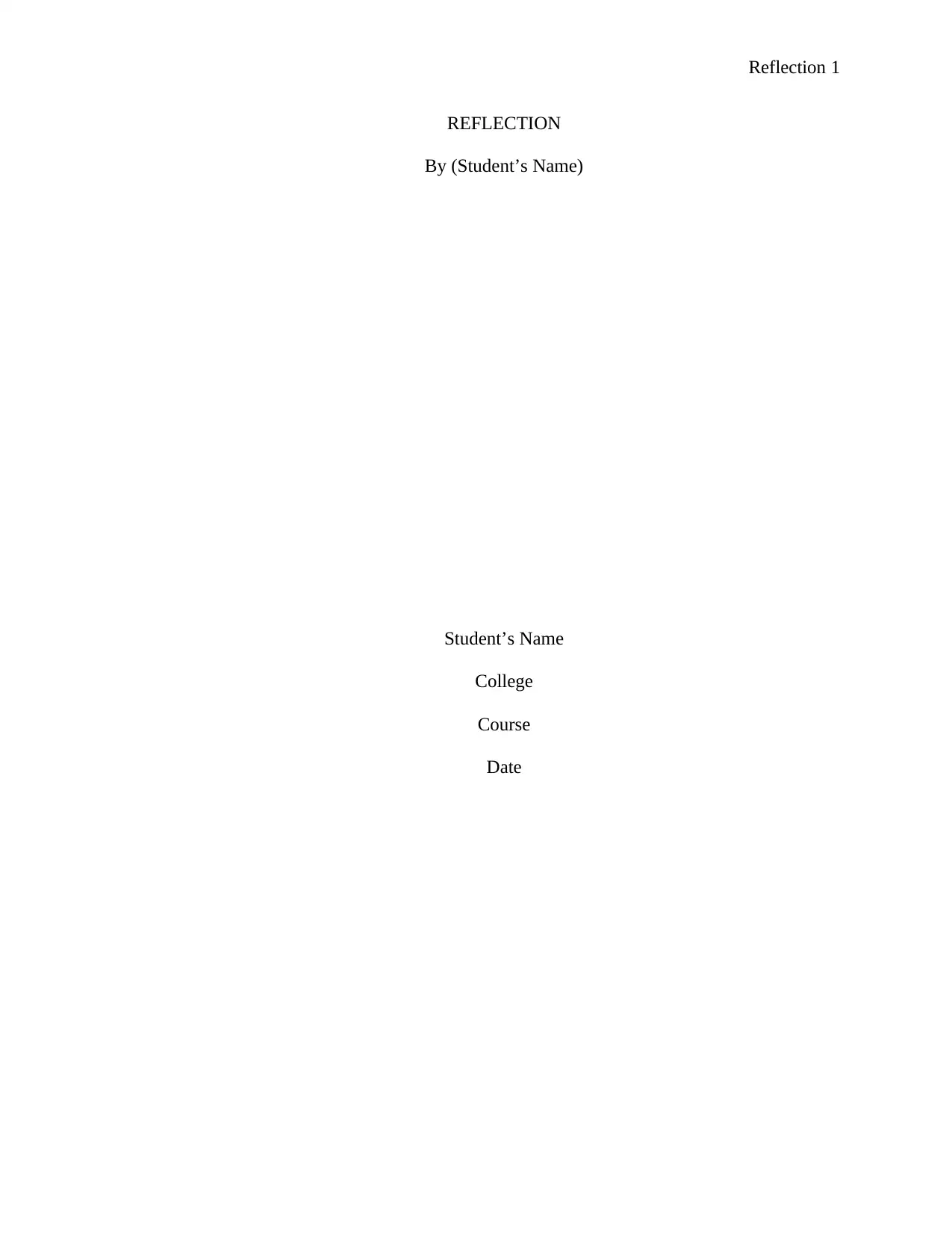
Reflection 1
REFLECTION
By (Student’s Name)
Student’s Name
College
Course
Date
REFLECTION
By (Student’s Name)
Student’s Name
College
Course
Date
Paraphrase This Document
Need a fresh take? Get an instant paraphrase of this document with our AI Paraphraser
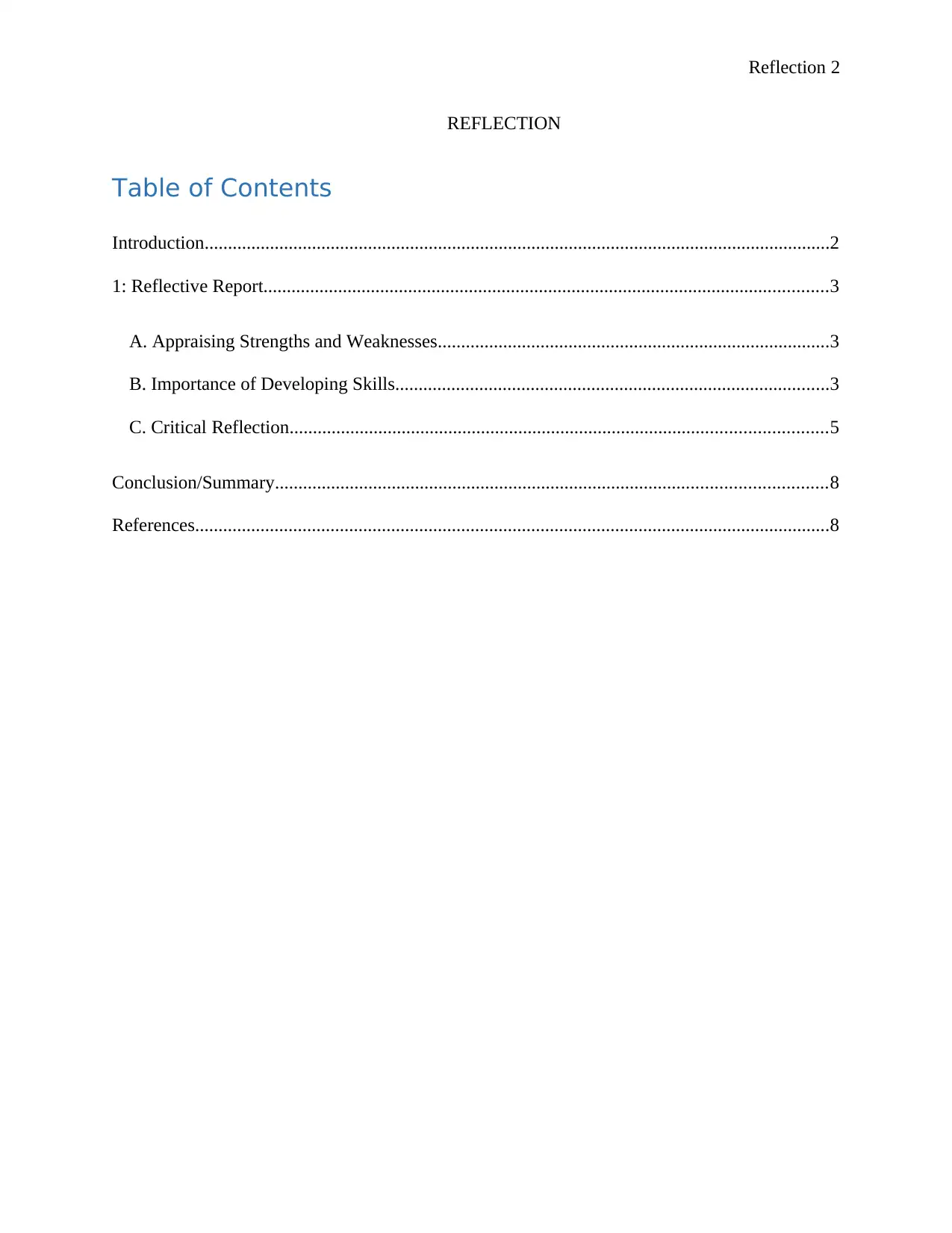
Reflection 2
REFLECTION
Table of Contents
Introduction......................................................................................................................................2
1: Reflective Report.........................................................................................................................3
A. Appraising Strengths and Weaknesses....................................................................................3
B. Importance of Developing Skills.............................................................................................3
C. Critical Reflection...................................................................................................................5
Conclusion/Summary......................................................................................................................8
References........................................................................................................................................8
REFLECTION
Table of Contents
Introduction......................................................................................................................................2
1: Reflective Report.........................................................................................................................3
A. Appraising Strengths and Weaknesses....................................................................................3
B. Importance of Developing Skills.............................................................................................3
C. Critical Reflection...................................................................................................................5
Conclusion/Summary......................................................................................................................8
References........................................................................................................................................8
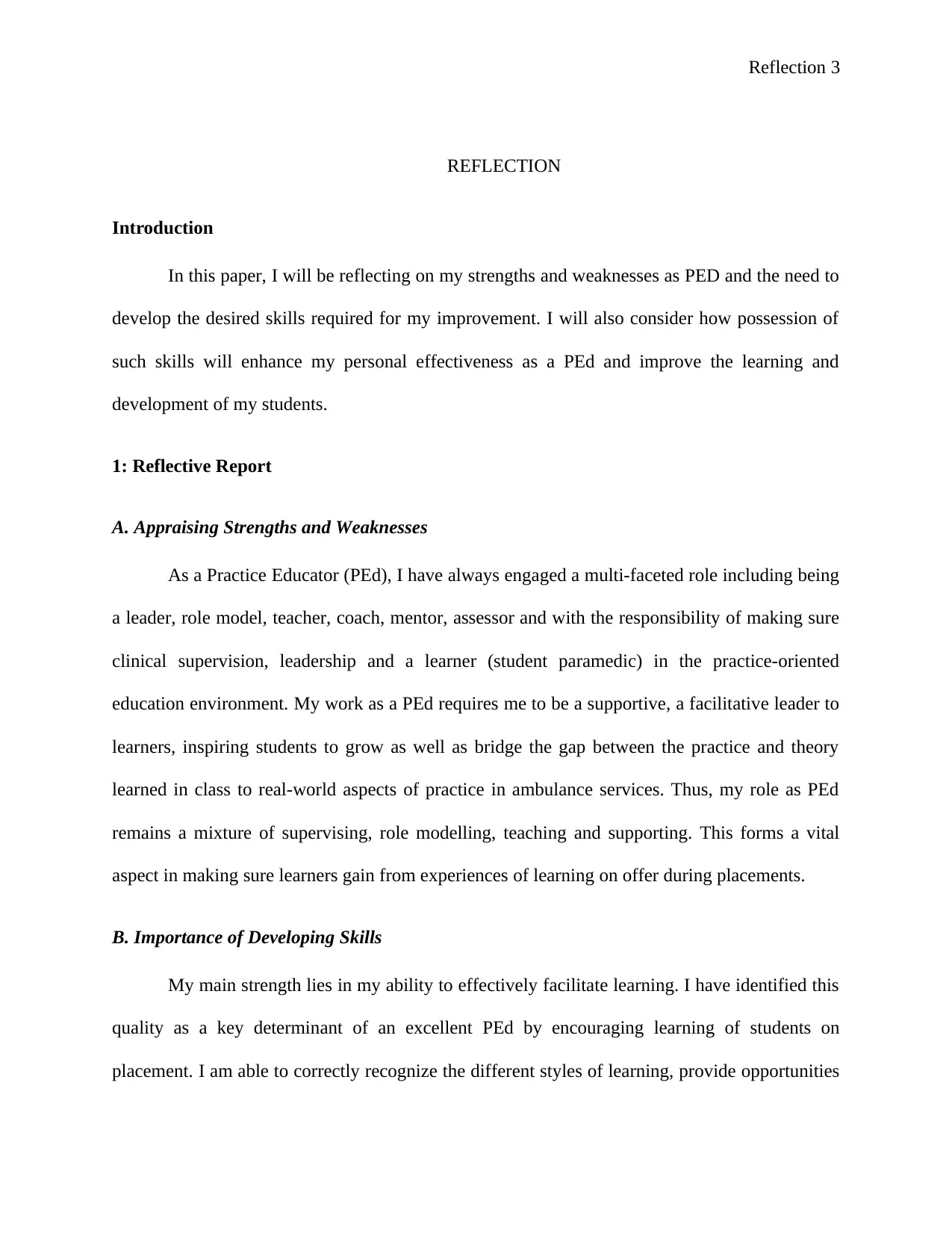
Reflection 3
REFLECTION
Introduction
In this paper, I will be reflecting on my strengths and weaknesses as PED and the need to
develop the desired skills required for my improvement. I will also consider how possession of
such skills will enhance my personal effectiveness as a PEd and improve the learning and
development of my students.
1: Reflective Report
A. Appraising Strengths and Weaknesses
As a Practice Educator (PEd), I have always engaged a multi-faceted role including being
a leader, role model, teacher, coach, mentor, assessor and with the responsibility of making sure
clinical supervision, leadership and a learner (student paramedic) in the practice-oriented
education environment. My work as a PEd requires me to be a supportive, a facilitative leader to
learners, inspiring students to grow as well as bridge the gap between the practice and theory
learned in class to real-world aspects of practice in ambulance services. Thus, my role as PEd
remains a mixture of supervising, role modelling, teaching and supporting. This forms a vital
aspect in making sure learners gain from experiences of learning on offer during placements.
B. Importance of Developing Skills
My main strength lies in my ability to effectively facilitate learning. I have identified this
quality as a key determinant of an excellent PEd by encouraging learning of students on
placement. I am able to correctly recognize the different styles of learning, provide opportunities
REFLECTION
Introduction
In this paper, I will be reflecting on my strengths and weaknesses as PED and the need to
develop the desired skills required for my improvement. I will also consider how possession of
such skills will enhance my personal effectiveness as a PEd and improve the learning and
development of my students.
1: Reflective Report
A. Appraising Strengths and Weaknesses
As a Practice Educator (PEd), I have always engaged a multi-faceted role including being
a leader, role model, teacher, coach, mentor, assessor and with the responsibility of making sure
clinical supervision, leadership and a learner (student paramedic) in the practice-oriented
education environment. My work as a PEd requires me to be a supportive, a facilitative leader to
learners, inspiring students to grow as well as bridge the gap between the practice and theory
learned in class to real-world aspects of practice in ambulance services. Thus, my role as PEd
remains a mixture of supervising, role modelling, teaching and supporting. This forms a vital
aspect in making sure learners gain from experiences of learning on offer during placements.
B. Importance of Developing Skills
My main strength lies in my ability to effectively facilitate learning. I have identified this
quality as a key determinant of an excellent PEd by encouraging learning of students on
placement. I am able to correctly recognize the different styles of learning, provide opportunities
⊘ This is a preview!⊘
Do you want full access?
Subscribe today to unlock all pages.

Trusted by 1+ million students worldwide
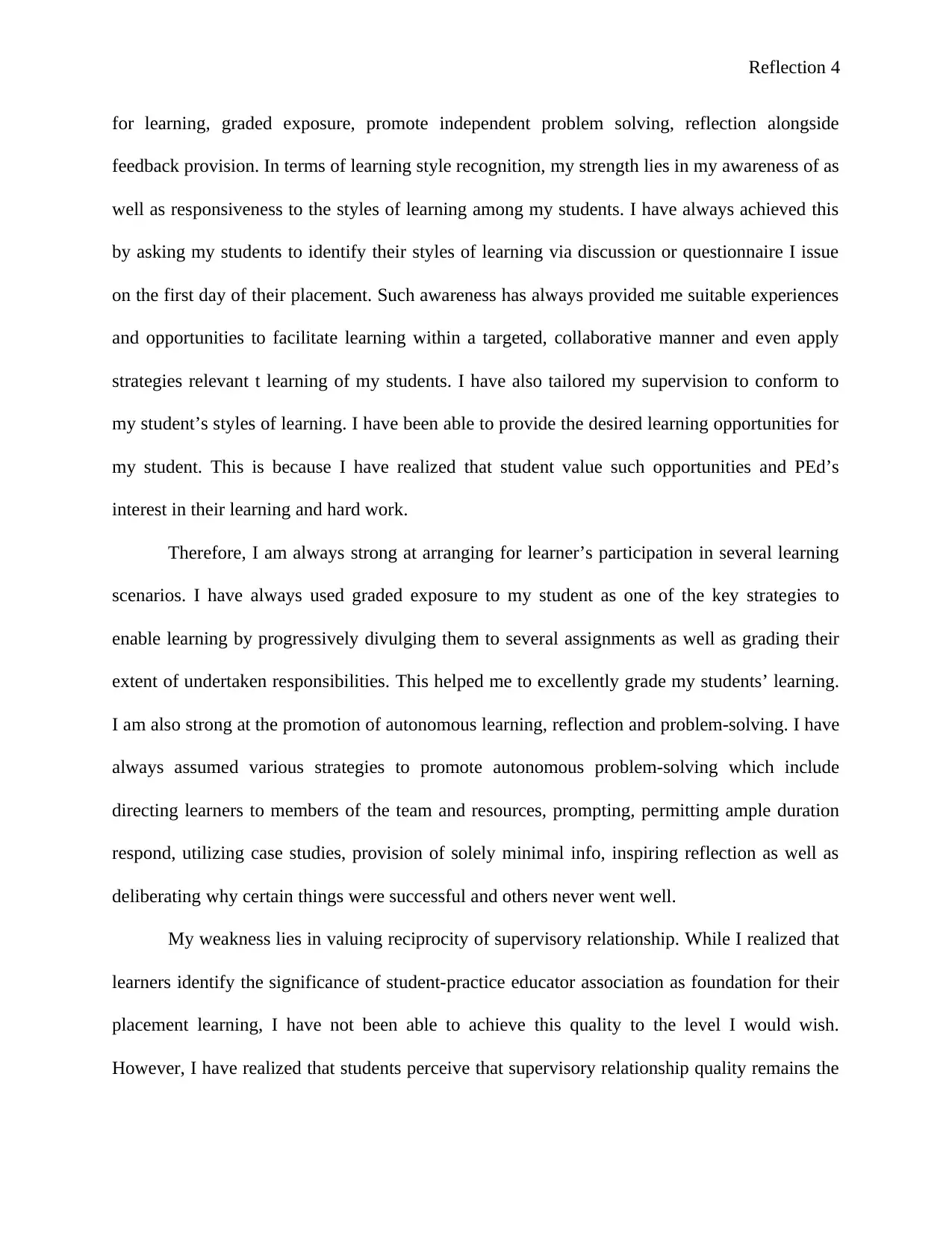
Reflection 4
for learning, graded exposure, promote independent problem solving, reflection alongside
feedback provision. In terms of learning style recognition, my strength lies in my awareness of as
well as responsiveness to the styles of learning among my students. I have always achieved this
by asking my students to identify their styles of learning via discussion or questionnaire I issue
on the first day of their placement. Such awareness has always provided me suitable experiences
and opportunities to facilitate learning within a targeted, collaborative manner and even apply
strategies relevant t learning of my students. I have also tailored my supervision to conform to
my student’s styles of learning. I have been able to provide the desired learning opportunities for
my student. This is because I have realized that student value such opportunities and PEd’s
interest in their learning and hard work.
Therefore, I am always strong at arranging for learner’s participation in several learning
scenarios. I have always used graded exposure to my student as one of the key strategies to
enable learning by progressively divulging them to several assignments as well as grading their
extent of undertaken responsibilities. This helped me to excellently grade my students’ learning.
I am also strong at the promotion of autonomous learning, reflection and problem-solving. I have
always assumed various strategies to promote autonomous problem-solving which include
directing learners to members of the team and resources, prompting, permitting ample duration
respond, utilizing case studies, provision of solely minimal info, inspiring reflection as well as
deliberating why certain things were successful and others never went well.
My weakness lies in valuing reciprocity of supervisory relationship. While I realized that
learners identify the significance of student-practice educator association as foundation for their
placement learning, I have not been able to achieve this quality to the level I would wish.
However, I have realized that students perceive that supervisory relationship quality remains the
for learning, graded exposure, promote independent problem solving, reflection alongside
feedback provision. In terms of learning style recognition, my strength lies in my awareness of as
well as responsiveness to the styles of learning among my students. I have always achieved this
by asking my students to identify their styles of learning via discussion or questionnaire I issue
on the first day of their placement. Such awareness has always provided me suitable experiences
and opportunities to facilitate learning within a targeted, collaborative manner and even apply
strategies relevant t learning of my students. I have also tailored my supervision to conform to
my student’s styles of learning. I have been able to provide the desired learning opportunities for
my student. This is because I have realized that student value such opportunities and PEd’s
interest in their learning and hard work.
Therefore, I am always strong at arranging for learner’s participation in several learning
scenarios. I have always used graded exposure to my student as one of the key strategies to
enable learning by progressively divulging them to several assignments as well as grading their
extent of undertaken responsibilities. This helped me to excellently grade my students’ learning.
I am also strong at the promotion of autonomous learning, reflection and problem-solving. I have
always assumed various strategies to promote autonomous problem-solving which include
directing learners to members of the team and resources, prompting, permitting ample duration
respond, utilizing case studies, provision of solely minimal info, inspiring reflection as well as
deliberating why certain things were successful and others never went well.
My weakness lies in valuing reciprocity of supervisory relationship. While I realized that
learners identify the significance of student-practice educator association as foundation for their
placement learning, I have not been able to achieve this quality to the level I would wish.
However, I have realized that students perceive that supervisory relationship quality remains the
Paraphrase This Document
Need a fresh take? Get an instant paraphrase of this document with our AI Paraphraser
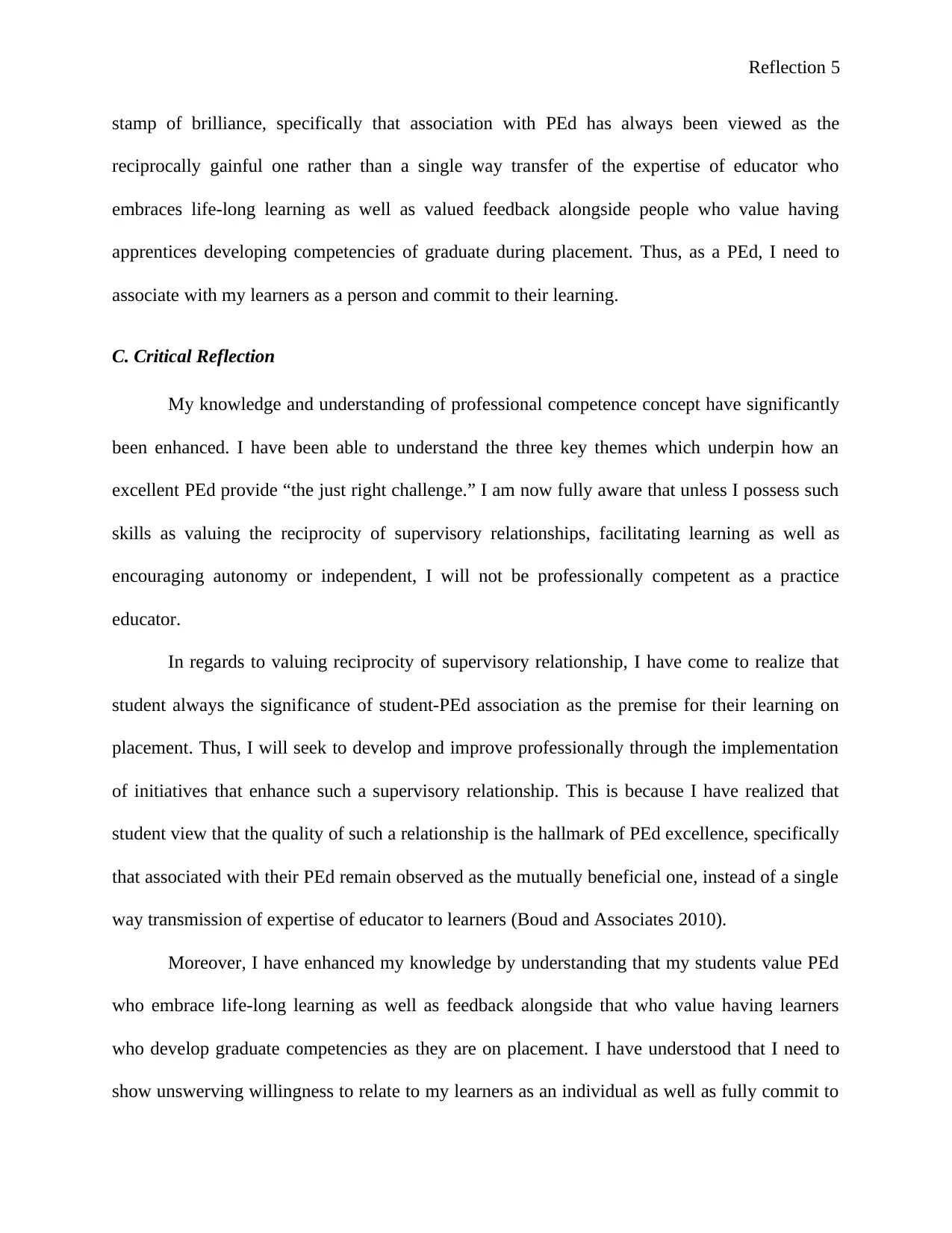
Reflection 5
stamp of brilliance, specifically that association with PEd has always been viewed as the
reciprocally gainful one rather than a single way transfer of the expertise of educator who
embraces life-long learning as well as valued feedback alongside people who value having
apprentices developing competencies of graduate during placement. Thus, as a PEd, I need to
associate with my learners as a person and commit to their learning.
C. Critical Reflection
My knowledge and understanding of professional competence concept have significantly
been enhanced. I have been able to understand the three key themes which underpin how an
excellent PEd provide “the just right challenge.” I am now fully aware that unless I possess such
skills as valuing the reciprocity of supervisory relationships, facilitating learning as well as
encouraging autonomy or independent, I will not be professionally competent as a practice
educator.
In regards to valuing reciprocity of supervisory relationship, I have come to realize that
student always the significance of student-PEd association as the premise for their learning on
placement. Thus, I will seek to develop and improve professionally through the implementation
of initiatives that enhance such a supervisory relationship. This is because I have realized that
student view that the quality of such a relationship is the hallmark of PEd excellence, specifically
that associated with their PEd remain observed as the mutually beneficial one, instead of a single
way transmission of expertise of educator to learners (Boud and Associates 2010).
Moreover, I have enhanced my knowledge by understanding that my students value PEd
who embrace life-long learning as well as feedback alongside that who value having learners
who develop graduate competencies as they are on placement. I have understood that I need to
show unswerving willingness to relate to my learners as an individual as well as fully commit to
stamp of brilliance, specifically that association with PEd has always been viewed as the
reciprocally gainful one rather than a single way transfer of the expertise of educator who
embraces life-long learning as well as valued feedback alongside people who value having
apprentices developing competencies of graduate during placement. Thus, as a PEd, I need to
associate with my learners as a person and commit to their learning.
C. Critical Reflection
My knowledge and understanding of professional competence concept have significantly
been enhanced. I have been able to understand the three key themes which underpin how an
excellent PEd provide “the just right challenge.” I am now fully aware that unless I possess such
skills as valuing the reciprocity of supervisory relationships, facilitating learning as well as
encouraging autonomy or independent, I will not be professionally competent as a practice
educator.
In regards to valuing reciprocity of supervisory relationship, I have come to realize that
student always the significance of student-PEd association as the premise for their learning on
placement. Thus, I will seek to develop and improve professionally through the implementation
of initiatives that enhance such a supervisory relationship. This is because I have realized that
student view that the quality of such a relationship is the hallmark of PEd excellence, specifically
that associated with their PEd remain observed as the mutually beneficial one, instead of a single
way transmission of expertise of educator to learners (Boud and Associates 2010).
Moreover, I have enhanced my knowledge by understanding that my students value PEd
who embrace life-long learning as well as feedback alongside that who value having learners
who develop graduate competencies as they are on placement. I have understood that I need to
show unswerving willingness to relate to my learners as an individual as well as fully commit to
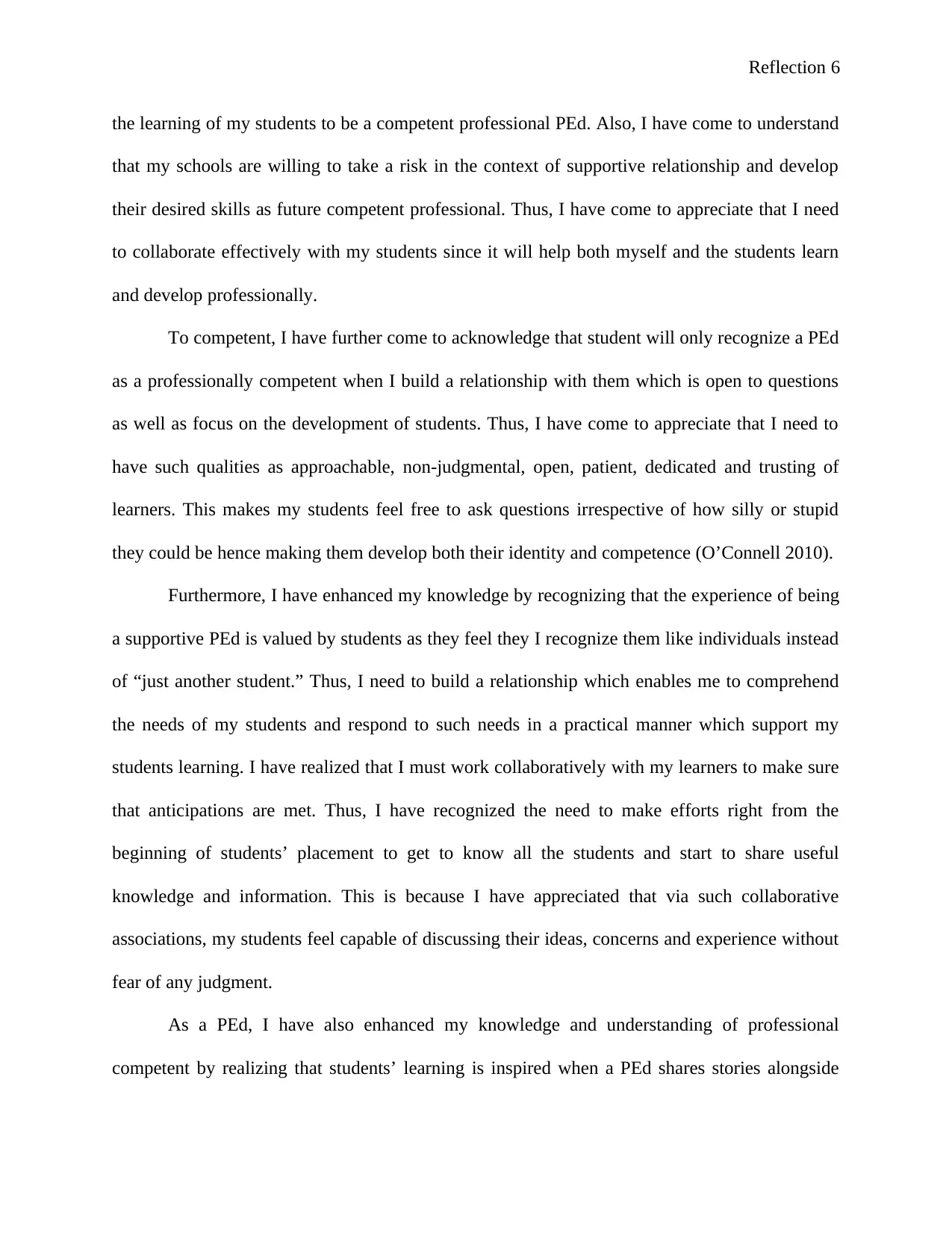
Reflection 6
the learning of my students to be a competent professional PEd. Also, I have come to understand
that my schools are willing to take a risk in the context of supportive relationship and develop
their desired skills as future competent professional. Thus, I have come to appreciate that I need
to collaborate effectively with my students since it will help both myself and the students learn
and develop professionally.
To competent, I have further come to acknowledge that student will only recognize a PEd
as a professionally competent when I build a relationship with them which is open to questions
as well as focus on the development of students. Thus, I have come to appreciate that I need to
have such qualities as approachable, non-judgmental, open, patient, dedicated and trusting of
learners. This makes my students feel free to ask questions irrespective of how silly or stupid
they could be hence making them develop both their identity and competence (O’Connell 2010).
Furthermore, I have enhanced my knowledge by recognizing that the experience of being
a supportive PEd is valued by students as they feel they I recognize them like individuals instead
of “just another student.” Thus, I need to build a relationship which enables me to comprehend
the needs of my students and respond to such needs in a practical manner which support my
students learning. I have realized that I must work collaboratively with my learners to make sure
that anticipations are met. Thus, I have recognized the need to make efforts right from the
beginning of students’ placement to get to know all the students and start to share useful
knowledge and information. This is because I have appreciated that via such collaborative
associations, my students feel capable of discussing their ideas, concerns and experience without
fear of any judgment.
As a PEd, I have also enhanced my knowledge and understanding of professional
competent by realizing that students’ learning is inspired when a PEd shares stories alongside
the learning of my students to be a competent professional PEd. Also, I have come to understand
that my schools are willing to take a risk in the context of supportive relationship and develop
their desired skills as future competent professional. Thus, I have come to appreciate that I need
to collaborate effectively with my students since it will help both myself and the students learn
and develop professionally.
To competent, I have further come to acknowledge that student will only recognize a PEd
as a professionally competent when I build a relationship with them which is open to questions
as well as focus on the development of students. Thus, I have come to appreciate that I need to
have such qualities as approachable, non-judgmental, open, patient, dedicated and trusting of
learners. This makes my students feel free to ask questions irrespective of how silly or stupid
they could be hence making them develop both their identity and competence (O’Connell 2010).
Furthermore, I have enhanced my knowledge by recognizing that the experience of being
a supportive PEd is valued by students as they feel they I recognize them like individuals instead
of “just another student.” Thus, I need to build a relationship which enables me to comprehend
the needs of my students and respond to such needs in a practical manner which support my
students learning. I have realized that I must work collaboratively with my learners to make sure
that anticipations are met. Thus, I have recognized the need to make efforts right from the
beginning of students’ placement to get to know all the students and start to share useful
knowledge and information. This is because I have appreciated that via such collaborative
associations, my students feel capable of discussing their ideas, concerns and experience without
fear of any judgment.
As a PEd, I have also enhanced my knowledge and understanding of professional
competent by realizing that students’ learning is inspired when a PEd shares stories alongside
⊘ This is a preview!⊘
Do you want full access?
Subscribe today to unlock all pages.

Trusted by 1+ million students worldwide
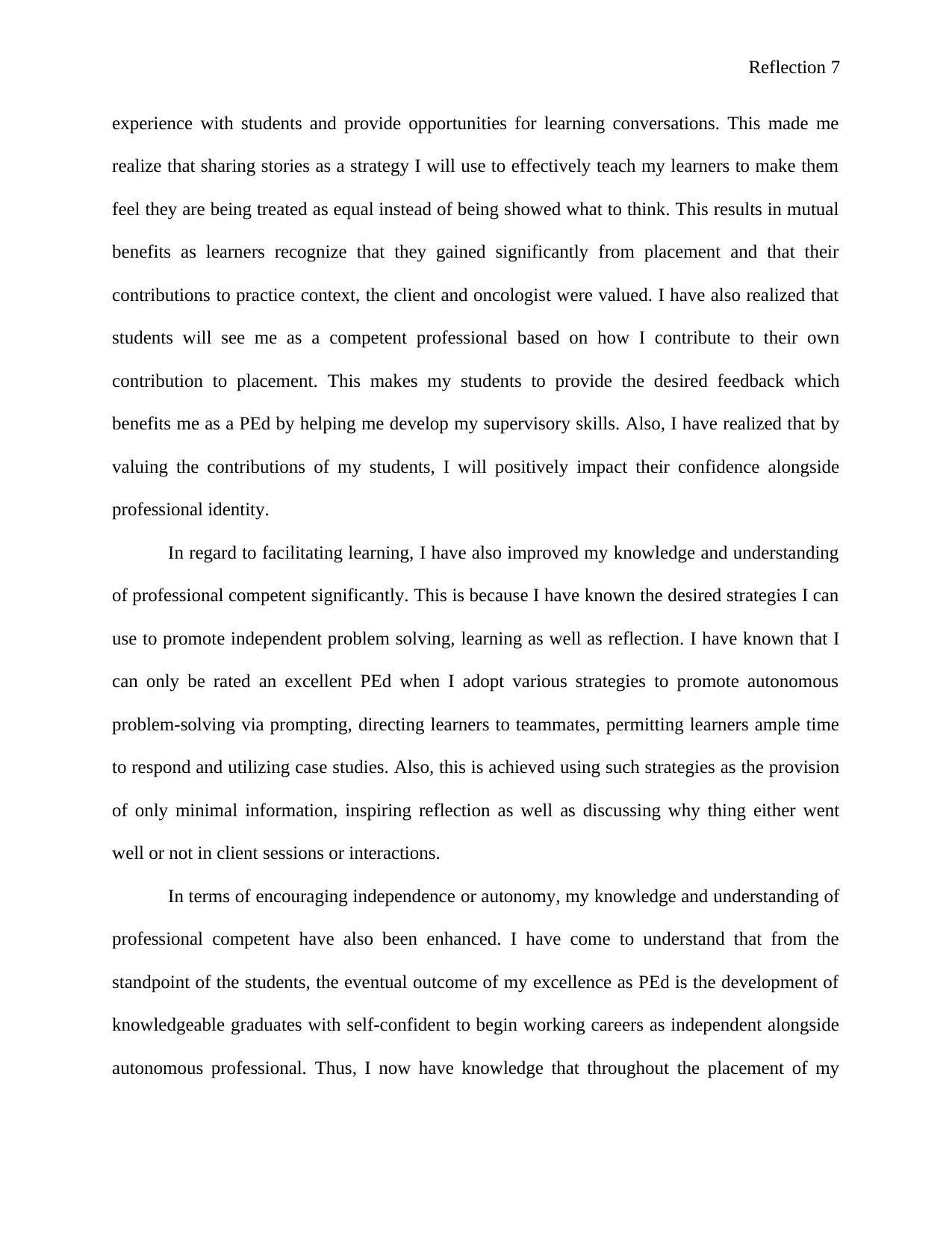
Reflection 7
experience with students and provide opportunities for learning conversations. This made me
realize that sharing stories as a strategy I will use to effectively teach my learners to make them
feel they are being treated as equal instead of being showed what to think. This results in mutual
benefits as learners recognize that they gained significantly from placement and that their
contributions to practice context, the client and oncologist were valued. I have also realized that
students will see me as a competent professional based on how I contribute to their own
contribution to placement. This makes my students to provide the desired feedback which
benefits me as a PEd by helping me develop my supervisory skills. Also, I have realized that by
valuing the contributions of my students, I will positively impact their confidence alongside
professional identity.
In regard to facilitating learning, I have also improved my knowledge and understanding
of professional competent significantly. This is because I have known the desired strategies I can
use to promote independent problem solving, learning as well as reflection. I have known that I
can only be rated an excellent PEd when I adopt various strategies to promote autonomous
problem-solving via prompting, directing learners to teammates, permitting learners ample time
to respond and utilizing case studies. Also, this is achieved using such strategies as the provision
of only minimal information, inspiring reflection as well as discussing why thing either went
well or not in client sessions or interactions.
In terms of encouraging independence or autonomy, my knowledge and understanding of
professional competent have also been enhanced. I have come to understand that from the
standpoint of the students, the eventual outcome of my excellence as PEd is the development of
knowledgeable graduates with self-confident to begin working careers as independent alongside
autonomous professional. Thus, I now have knowledge that throughout the placement of my
experience with students and provide opportunities for learning conversations. This made me
realize that sharing stories as a strategy I will use to effectively teach my learners to make them
feel they are being treated as equal instead of being showed what to think. This results in mutual
benefits as learners recognize that they gained significantly from placement and that their
contributions to practice context, the client and oncologist were valued. I have also realized that
students will see me as a competent professional based on how I contribute to their own
contribution to placement. This makes my students to provide the desired feedback which
benefits me as a PEd by helping me develop my supervisory skills. Also, I have realized that by
valuing the contributions of my students, I will positively impact their confidence alongside
professional identity.
In regard to facilitating learning, I have also improved my knowledge and understanding
of professional competent significantly. This is because I have known the desired strategies I can
use to promote independent problem solving, learning as well as reflection. I have known that I
can only be rated an excellent PEd when I adopt various strategies to promote autonomous
problem-solving via prompting, directing learners to teammates, permitting learners ample time
to respond and utilizing case studies. Also, this is achieved using such strategies as the provision
of only minimal information, inspiring reflection as well as discussing why thing either went
well or not in client sessions or interactions.
In terms of encouraging independence or autonomy, my knowledge and understanding of
professional competent have also been enhanced. I have come to understand that from the
standpoint of the students, the eventual outcome of my excellence as PEd is the development of
knowledgeable graduates with self-confident to begin working careers as independent alongside
autonomous professional. Thus, I now have knowledge that throughout the placement of my
Paraphrase This Document
Need a fresh take? Get an instant paraphrase of this document with our AI Paraphraser
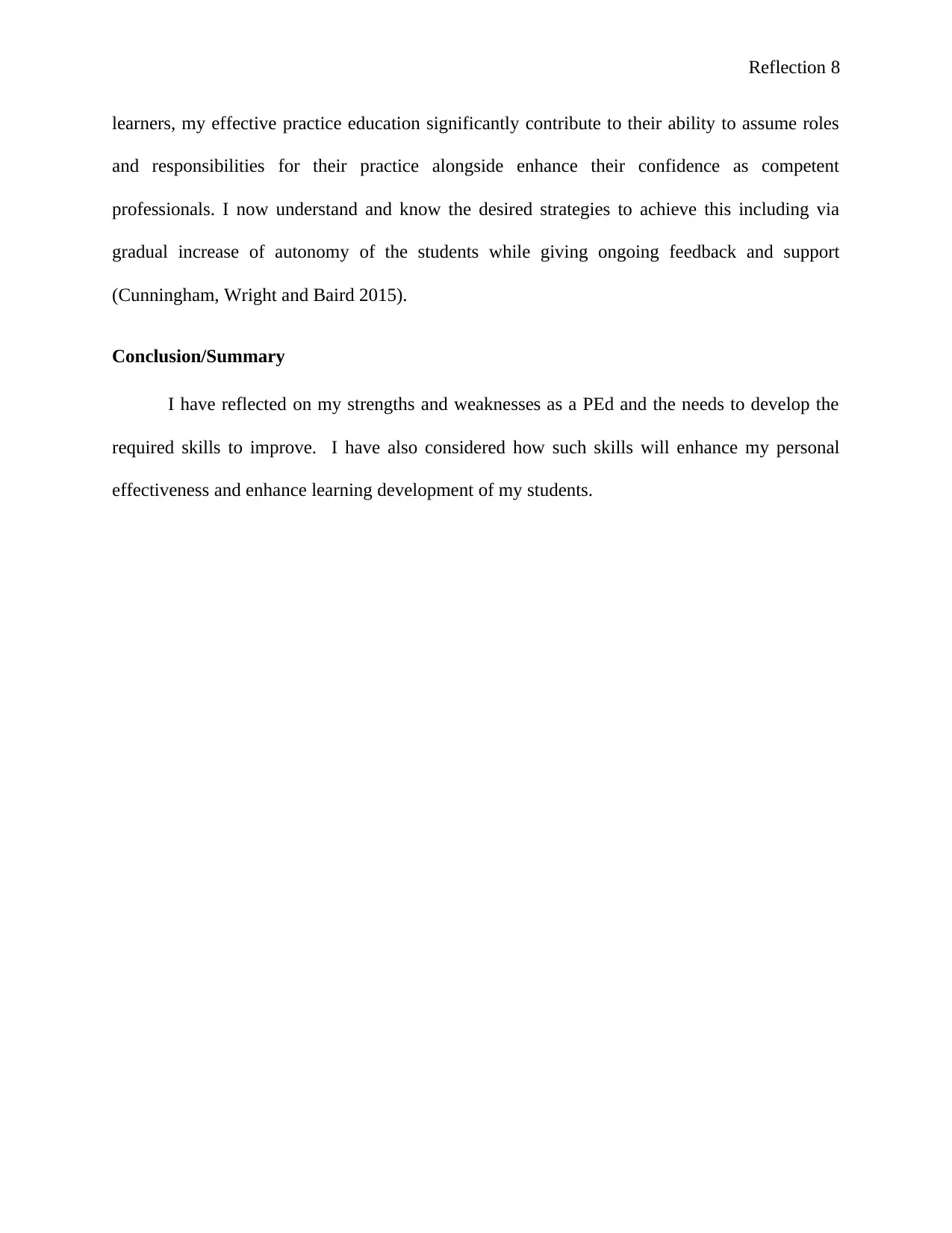
Reflection 8
learners, my effective practice education significantly contribute to their ability to assume roles
and responsibilities for their practice alongside enhance their confidence as competent
professionals. I now understand and know the desired strategies to achieve this including via
gradual increase of autonomy of the students while giving ongoing feedback and support
(Cunningham, Wright and Baird 2015).
Conclusion/Summary
I have reflected on my strengths and weaknesses as a PEd and the needs to develop the
required skills to improve. I have also considered how such skills will enhance my personal
effectiveness and enhance learning development of my students.
learners, my effective practice education significantly contribute to their ability to assume roles
and responsibilities for their practice alongside enhance their confidence as competent
professionals. I now understand and know the desired strategies to achieve this including via
gradual increase of autonomy of the students while giving ongoing feedback and support
(Cunningham, Wright and Baird 2015).
Conclusion/Summary
I have reflected on my strengths and weaknesses as a PEd and the needs to develop the
required skills to improve. I have also considered how such skills will enhance my personal
effectiveness and enhance learning development of my students.
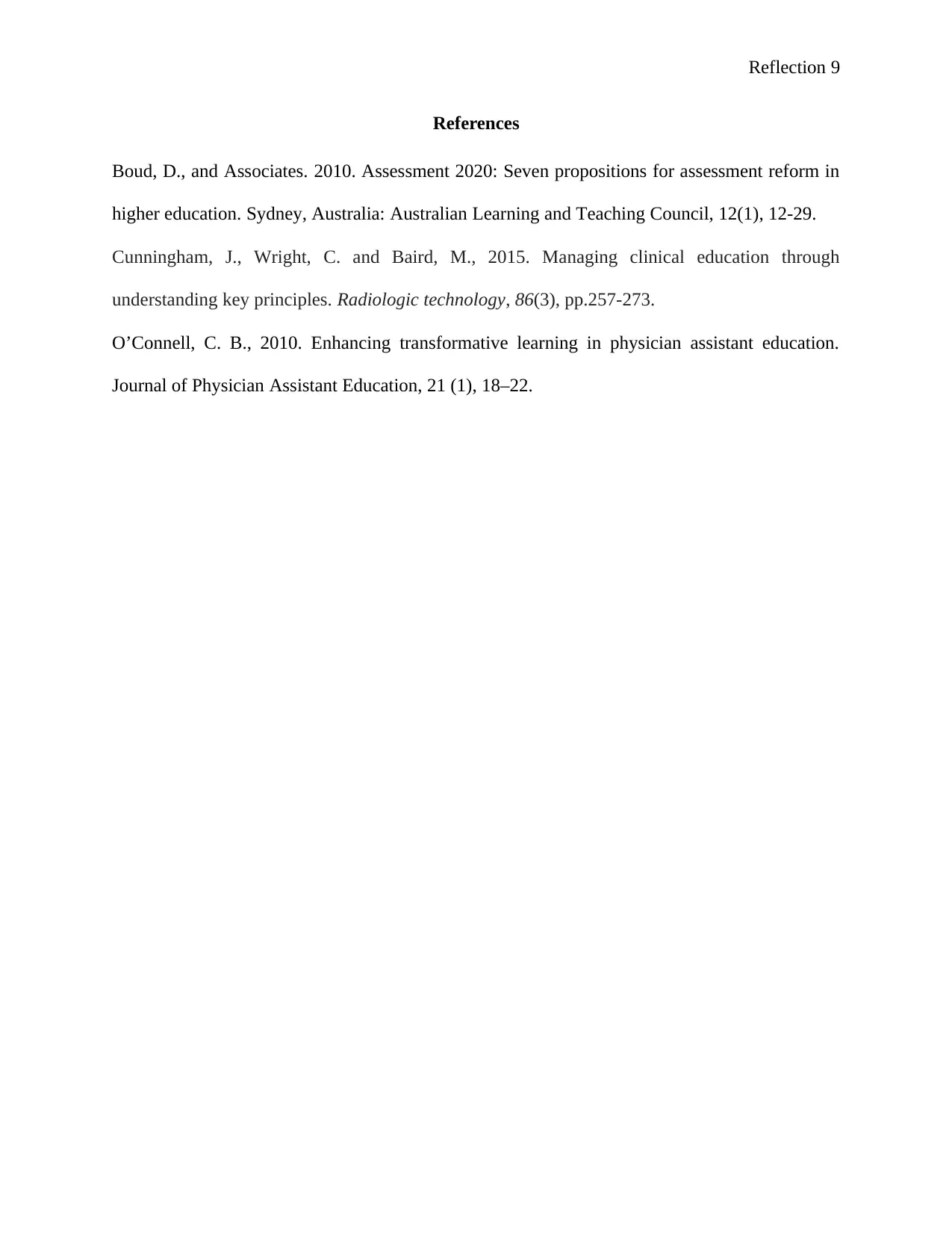
Reflection 9
References
Boud, D., and Associates. 2010. Assessment 2020: Seven propositions for assessment reform in
higher education. Sydney, Australia: Australian Learning and Teaching Council, 12(1), 12-29.
Cunningham, J., Wright, C. and Baird, M., 2015. Managing clinical education through
understanding key principles. Radiologic technology, 86(3), pp.257-273.
O’Connell, C. B., 2010. Enhancing transformative learning in physician assistant education.
Journal of Physician Assistant Education, 21 (1), 18–22.
References
Boud, D., and Associates. 2010. Assessment 2020: Seven propositions for assessment reform in
higher education. Sydney, Australia: Australian Learning and Teaching Council, 12(1), 12-29.
Cunningham, J., Wright, C. and Baird, M., 2015. Managing clinical education through
understanding key principles. Radiologic technology, 86(3), pp.257-273.
O’Connell, C. B., 2010. Enhancing transformative learning in physician assistant education.
Journal of Physician Assistant Education, 21 (1), 18–22.
⊘ This is a preview!⊘
Do you want full access?
Subscribe today to unlock all pages.

Trusted by 1+ million students worldwide
1 out of 9
Related Documents
Your All-in-One AI-Powered Toolkit for Academic Success.
+13062052269
info@desklib.com
Available 24*7 on WhatsApp / Email
![[object Object]](/_next/static/media/star-bottom.7253800d.svg)
Unlock your academic potential
Copyright © 2020–2025 A2Z Services. All Rights Reserved. Developed and managed by ZUCOL.




